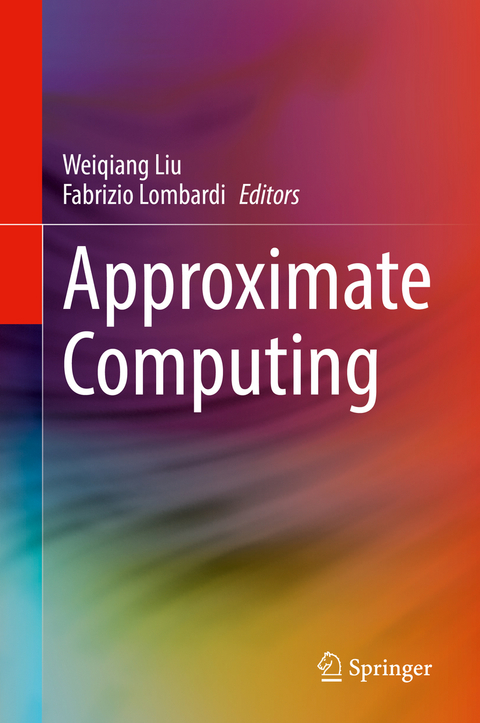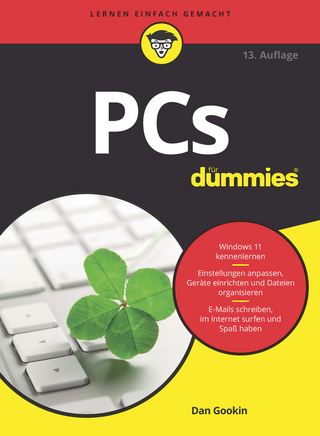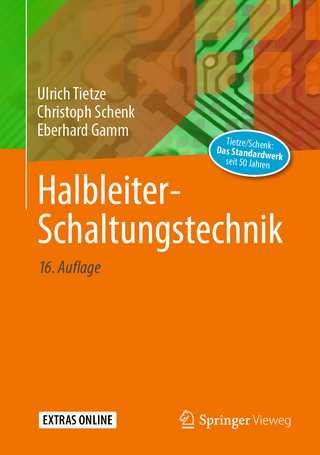
Approximate Computing
Springer International Publishing (Verlag)
978-3-030-98346-8 (ISBN)
- Serves as a single-source reference to state-of-the-art of approximate computing;
- Covers broad range of topics, from circuits to applications;
- Includes contributions by leading researchers, from academia and industry.
lt;p> Weiqiang Liu is currently a Professor and the Vice Dean of College of Electronic and Information Engineering & College of Integrated Circuits, Nanjing University of Aeronautics and Astronautics (NUAA), Nanjing, China. He received the B.Sc. degree in Information Engineering from NUAA and the Ph.D. degree in Electronic Engineering from Queen's University Belfast (QUB), Belfast, United Kingdom, in 2006 and 2012, respectively. In Dec. 2013, he joined the College of Electronic and Information Engineering, NUAA, where he is now a full professor.
His research interest is energy efficient and secure computing integrated circuits and systems that include approximate computing, computer arithmetic, hardware security, VLSI design for DSP and cryptography, and mixed-signal integrated circuits. His research has been funded by Natural Science Foundation China (NSFC), State Grid Corporation of China, and Natural Science Foundation of Jiangsu Province et al. He has published one research book by Artech House and over 160 leading journal and conference papers (over 60 IEEE and ACM journals). His papers were selected as the Highlight Paper of IEEE Transactions on Circuits and Systems I: Regular Papers in the 2021 Januray Issue, the two Feature Papers of IEEE Circuits and Systems Magazine in the 2021 4th issue and IEEE Transactions on Computers in the 2017 December issue, and IET Computer & Design Techniques Editor's Choice Award in 2021. He received the prestigious Excellent Young Scientists Fund from NSFC in 2020 and listed in the Stanford University's 2020 list of the top 2% scientists in the world (Computer Hardware and Architecture).
He has served as a Steering Committe Member of IEEE Transactions on VLSI Systems and IEEE Transactions on Multi-Scale Computing Systems, Associate Editors of IEEE Transactions on Circuits and Systems I: Regular Paper, IEEE Transactions on Emerging Topic in Computing and Computers (TETC), IEEE Transactions on Computers, IEEE Open Journal of Computer Soceity and IET Computers & Digital Techniques, a Guest Editor of Proceedings of the IEEE and IEEE Nanotechnology Magazine, the member of 2020 TETC and AsianHOST 2021 Best Paper Award Committee. He is the Second Representative of IEEE Computer Society to the IEEE Nanotechnology Council (NTC). He is the Program Co-Chair of IEEE Symposium on Computer Arithmetic (ARITH), and program members for a number of international conferences including DAC, ARITH, DATE, ASP-DAC, ISCAS, ASAP, ISVLSI, ICCD, GLSVLSI, AsianHOST, NANORACH, AICAS, SiPS, NMDC and ICONIP. He is a speaker of DATE 2022, IEEE ISCAS 2021 and COINS Tutorial. He is a member of both Circuits & Systems for Communications (CASCOM) Technical Committee and VLSI Systems and Applications (VSA) Technical Committee, IEEE Circuits and Systems Society. He is a Senior Member of the IEEE, CIE and CCF.
Fabrizio Lombardi graduated in 1977 from the University of Essex (UK) with a B.Sc. (Hons.) in Electronic Engineering. In 1977 he joined the Microwave Research Unit at University College London, where he received the Master in Microwaves and Modern Optics (1978), the Diploma in Microwave Engineering (1978) and the Ph. D. from the University of London (1982). He is currently the holder of the International Test Conference (ITC) Endowed Chair at Northeastern University, Boston. Currently, Dr. Lombardi is the 2022-2023 President; of the IEEE Nanotechnology Council (NTC); in 2021 he was 2nd VP of the IEEE Computer Society (CS). He is also a member of the IEEE Publication Services and Products Board (PSPB) (2019-2023). He was the VP of Publications of the IEEE CS (2019-2020) and the NTC (2020). He has been appointed on Executive Boards of many non-profit organizations (such as Computing-in-the-Core, now code.org the non-partisan advocacy coalition for K-12 Computer Science educa
Part I Approximate Arithmetic and Circuits.- 1-Approximate Arithmetic Circuits: Design and Applications.- 2-An Automated Logic Level Framework for Approximate Modular Arithmetic Circuits.- 3-Approximate Multiplier Design for Energy Efficiency: From Circuit to Algorithm.- 4-Low-Precision Floating-Point Formats: From General-Purpose to Application-Specific.- 5-Spintronic Solutions for Approximate Computing.- 6-Majority Logic Based Approximate Multipliers for Error-Tolerant Applications.- Part II Design Automation and Test.- 7-Approximate Logic Synthesis for FPGA by Decomposition.- 8-Design Techniques for Approximate Realization of Data-Flow Graphs.- 9-Approximation on Data Flow Graph Execution for Energy Efficiency.- 10-Test and Reliability of Approximate Hardware.- Part III Security.- 11-SecurityVulnerabilities in Approximate Circuits.- 12-Voltage Overscaling Techniques for Security Applications.- 13-Approximate Computing for Cryptography.- 14-Towards Securing Approximate Computing Systems: Security Threats and Attack Mitigation.- Part IV Neural Networks and Machine Learning.- 15-Approximate Computing for Machine Learning Workloads: A circuits and systems perspective.- 16-Approximate Computing for Efficient Neural Network Computation.- 17-Enabling Efficient Inference of Convolutional Neural Networks via Approximation.- 18-Approximate Computing for Energy-Constrained DNN-based Speech Recognition.- 19-Efficient Approximate DNN Accelerators for Edge Devices.- Part V Applications.- 20-Cross-Level Design of Approximate Computing for Continuous Perception System.- 21-Approximate Computing in Image Compression and Denoising.- 22-Approximate Computation for Baseband Processing.
| Erscheinungsdatum | 24.08.2022 |
|---|---|
| Zusatzinfo | XVIII, 600 p. 350 illus., 202 illus. in color. |
| Verlagsort | Cham |
| Sprache | englisch |
| Maße | 155 x 235 mm |
| Gewicht | 1041 g |
| Themenwelt | Informatik ► Weitere Themen ► Hardware |
| Technik ► Elektrotechnik / Energietechnik | |
| Schlagworte | approximate by design • Approximate Circuits • probabilistic computing • stochastic computing • variability tolerance |
| ISBN-10 | 3-030-98346-3 / 3030983463 |
| ISBN-13 | 978-3-030-98346-8 / 9783030983468 |
| Zustand | Neuware |
| Haben Sie eine Frage zum Produkt? |
aus dem Bereich


